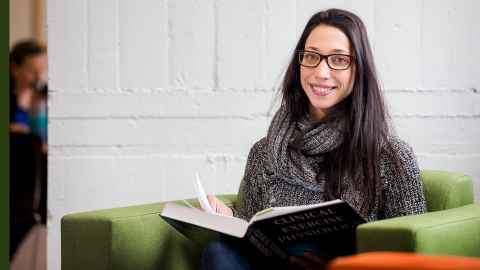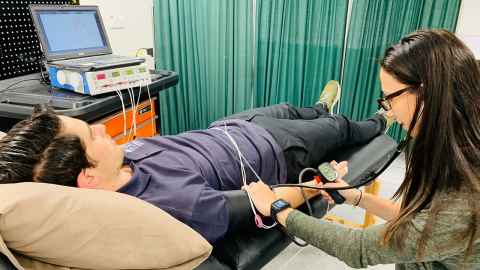Ellie Rickman
Meet Ellie Rickman, a PhD candidate in Exercise Science researching the impact of exercise on cardiovascular disease in adults.

Programme: PhD Exercise Sciences
Research topic: Characterization of skin microvascular function in relation to aerobic capacity
Supervisors: Dr Stacey Reading and Dr Graeme Carrick-Ranson
Academic unit: Department of Exercise Sciences
Funding: University of Auckland Doctoral Scholarship
Journey to doctoral studies
"I grew up in Australia in north Queensland, and moved to Auckland for my bachelor degree in Sport and Exercise Science. When I completed in 2013, I returned to Australia and spend a year working within the field before coming back the University of Auckland to study a Master of Science in Clinical Exercise Physiology. During my degree, I was fortunate enough to have hands-on clinical experience in the Health and Rehabilitation Clinic and to conduct my own research in the exercise physiology laboratory. These opportunities helped me develop a strong interest in cardiovascular physiology and research, which led me to purse a PhD."
The research I’m doing is exciting, but working with people and having a
positive effect on their health and quality of life is extremely gratifying.
Research with impact
"Chronic diseases such as diabetes and cardiovascular disease can alter the regulation and function of our smallest blood vessels. We call this the skin microcirculation. It is important because the skin shares similar regulatory mechanisms to other microvascular beds – many of which cannot be easily studied, such as the heart and skeletal muscle. The skin microcirculation, therefore, may be used as a potential non-invasive model for investigating the effects of exercise training on microvascular regulation in less-accessible tissue beds. My research does just this, examining the relationship between skin microvascular regulation and aerobic fitness in older adults with and without cardiovascular disease. This type of research is important because it could lead to new and improved methods for monitoring training-related adaptations in adults with cardiovascular disease."

Life as a researcher
"Part of my research involves putting participants through a 12-week exercise programme at our Health and Rehabilitation Clinic. Each person attends three times per week, so it means that I spend a large amount of my time supervising and monitoring my research participants through their sessions. It also means I spend a large amount of time in the lab collecting and analysing all the data I gather.
"I presented at my first international conference as a doctoral candidate last year when I attended the American College of Sports Medicine conference in the USA. While I was there, I also took the opportunity to visit the MAYO clinic in Rochester
"I’m lucky to have a fantastic support network of other doctoral candidates, friends and work colleagues. Being part of a small department has really helped because it makes it easy to build and maintain relationships with staff and other students."